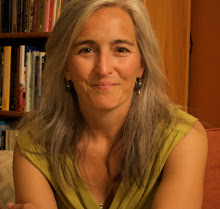It was one of those moments when “just the facts, ma’am” are unnecessary and uncalled for, and the abruptly delivered statement felt especially gratuitous because, despite absence of legal onus - my son’s step dad had been generously and lovingly going above and beyond the call of duty to be present for and help his stepchild.
Clearly, the initial shocking days following a child’s cancer diagnosis are hardly emotionally suitable circumstances to cite custodial provisos. Nonetheless, weeks later the statement's intent and implications continued to rattle around and raise questions in my mind, like: What exactly are our obligations to anyone or anything? and When do we accept responsibility - not because we HAVE to, but because we choose to?
Imagine a world where people adhere only to their own private “to do” - or rather “NOT to do” list:
- It’s not my fault there was an Earthquake in Haiti; I don’t have to send money there.
- I’m not driving one less car because of some melting ice cap a thousand miles away; after all, I’m no polar bear.
- I’m not gay, so it’s not my concern whether they can marry or not. Why bother voting?
- Hey, that person didn’t have the good sense to get health insurance; I’m not paying for their prescription. I look out for me and mine; so should they.
- My children are grown and gone; I don’t need to help the local schools any more.
- He’s not my kid by blood, so I’m not responsible to help if he has cancer.
Granted, I’m exaggerating, or am I? The sad fact is -- there are many moments in the human experience where we behave as though we are actually separate from one another and the world we live in. The sadder fact is that we don’t only behave this way; we sometimes even believe it. We then use that warped belief to excuse ourselves from taking responsibility -- not only for large acts of humanity and service, but small deeds that cost us nothing yet could yield extraordinarily positive results.
Committing one's self to a high level of personal responsibility empowers us to stretch and accept greater degrees of moral and social responsiblity. When we take authority for ourselves, our actions, choices and behaviors, then we also understand that - like the stone landing on a flat pond creates ripples, so do each of our words and deeds. This sort of mindfulness opens our eyes and heart, right from the moment we accept the invitation and act beyond our own private “to do” list.
So, to address the rattling questions: What exactly are our obligations to anyone or anything? And, when do we accept responsibility - not because we HAVE to, but because we choose to?
I once asked a wise person what was the “honorable thing to do” around being culpable (at risk to nothing other than ego) for a situation where both the other party and I felt equally righteous and wronged by the other. The reply was “That’s between you and God.” Our obligations - or lack thereof - may be dictated by a court order, signature or contract, but adhering to one’s moral imperative is an instant opportunity to be a better human being.
When we reach beyond ourselves, beyond the bare minimum or the basic requirements, we’re doing more than being responsible - we’re being compassionate.Theologian, Thomas Merton said, “Compassion is the keen awareness of the interdependence of all things.” With such awareness, we can integrate compassion into our whole selves. It progresses from being something that we only think, something that lives only in our minds (along with fear) and merges into our very fibre -- living in our hearts and taking shape through intentional and loving action.
Nope, Reid’s not his son. That is, in fact, a fact. What is also a fact is this: love took hold and became the mandate.




No comments:
Post a Comment